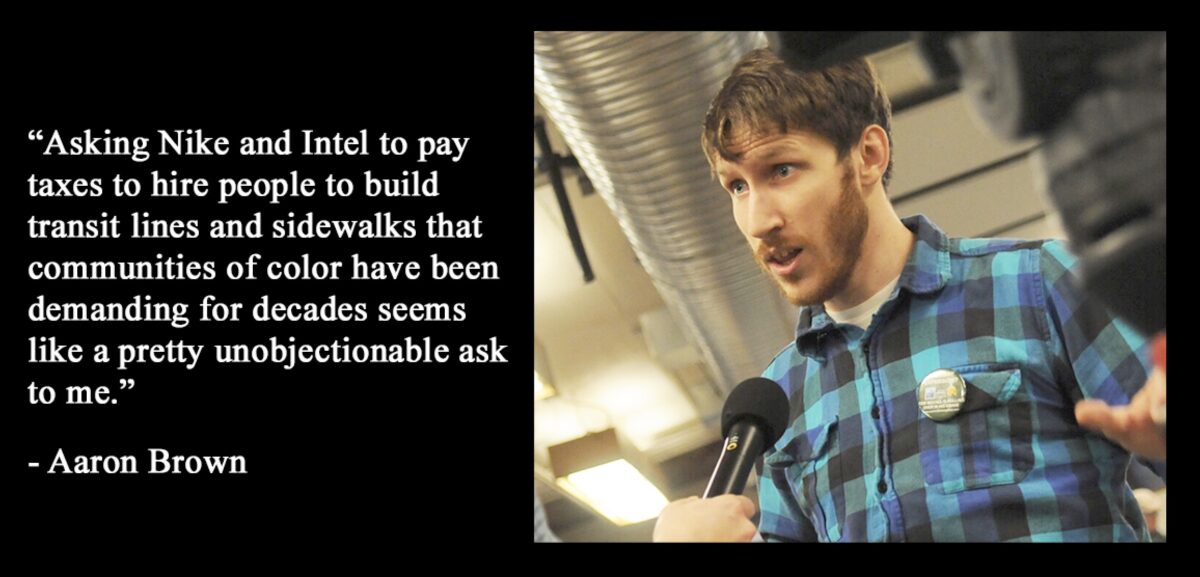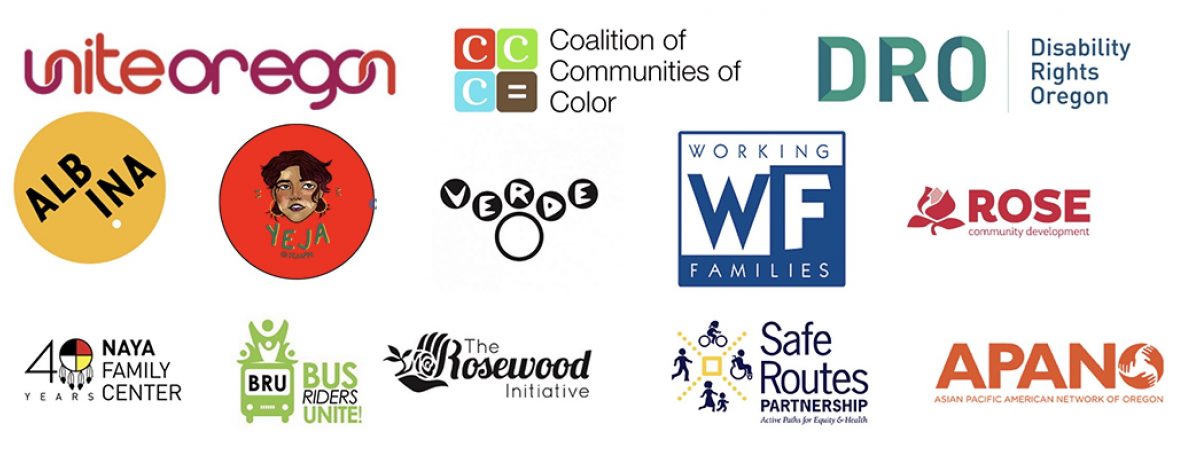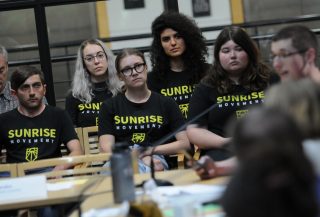
For nearly two decades, transportation advocates and forward-thinking politicians around the region have talked wistfully about “The Big One,” the opportunity to ask voters to approve funding for a massive litany of transit, bicycle, and pedestrian projects all over the region.
For the last eighteen months, a massive coalition of transportation wonks, social and racial justice advocates and climate hawks shot numerous spitballs at Metro and drew hard lines in the sand to push the agency to propose a transportation package in line with their values of carbon reduction, improved transportation options for the communities that need it most, and addressing violently deadly arterials that frequently kill and harm people trying to cross the street.
This week “The Big One” finally arrives in your mailbox. And this longtime transportation-minded, freeway-skeptic, community organizing rabblerouser is imploring you to vote “Yes” on Measure 26-218.
There are times to shoot spitballs (and lord knows I’ve shot plenty), and there are times to coalesce in support of funding for a vision for the region. I’m writing to tell you that the spitballs have effectively been shot, and now it’s time to support this effort and vote yes.

You can check the campaign website for the general campaign messaging you’re going to see on television ads and mailers – how Nike and Intel and other wealthy corporations enjoying handsome profits are dumping hundreds of thousands of dollars into opposing this measure, how crucial it’d be for our regional economic recovery to create 37,000+ jobs building bus lanes, how miserable traffic congestion is and how much worse it’ll get without massive investment in alternatives, how working families and 91% of small businesses won’t pay a dime. But the skepticism I’ve seen from BikePortland readers and my corners of social media are instead hung up on some belief this package “isn’t good enough for climate” or is somehow “insufficiently anti-car.”
That’s, politely, ludicrous.
What’s at stake
First, let’s be clear about exactly how many substantial bike, ped and transit projects will be funded: $111 million for PBOT’s Central City in Motion plan; major upgrades to deadly arterials we’ve been sick of forever (like SW Barbur, 82nd, McLoughlin, Tualatin Valley Highway, and Powell); $540 million for alone for a transit corridor on 82nd; $9 million for regional trails; $65 million for streetscape improvements in the Albina district, Youth Pass for the entire region, and much more.
If we vote yes, we get to channel our inner Bernie Sanders and tax wealthy corporations to hire tens of thousands of people to build safer streets and make crucial investments in these corridors and programs as economic recovery from our Covid recession.
If we vote no, we get nothing. Zilch. These plans for safer streets and priority bus lanes and separated bike lanes will instead sit on a shelf indefinitely, until Metro finds the guts and wherewithal to start all over and try again. Given the COVID-19 and wildfire-related bankruptcy of the state government, it’s unlikely we’ll find revenue or leadership from the sclerotic state legislature, (and the state DOT will certainly will be less likely to invest in making these corridors walkable and transit-friendly than Metro). There’s not exactly a Plan B for finding the money for any of these investments, many of which have been desperately called for from advocates and communities for decades.
Every one of Cortright’s suggestions on how to get people driving less will be more cost-effective to implement (and more equitable) if we build the streets, sidewalks, bus lanes and bike routes they will need to make the transition to a less car-reliant lifestyle.
But what about climate change?
Make no mistake – this is an investment in a climate-friendly transportation package.
You’ve probably seen the blog posts on City Observatory by my friend and No More Freeways co-conspirator Joe Cortright. While I have immense respect and gratitude for Joe, I simply disagree with his characterizations of this package, take umbrage with the assumptions implicit in his modeling, and laugh at his reading of a political landscape willing to fund transportation improvements with a more pigovian tax mechanism.
Joe’s central argument is that this package isn’t doing “enough” for climate. I’ll happily concede that Joe is correct in that there are other policy mechanisms we simply must pursue to decarbonize our transportation system. Cortright suggests we should be raising the gas tax, instituting congestion pricing, providing more funding for operations for TriMet’s frequent service, exploring the feasibility of progressive-minded vehicle registration fees, and changing the zoning code to get more housing near transit in the suburbs. These are, indeed, largely excellent policy goals and many candidates currently running for office promise to push the city, region and state to move in those directions while empowering frontline communities to figure out equitable implementation.
Before we hit people living in far-flung suburbs with, say, a 40 cent gas tax hike, let’s make sure there’s a safe crosswalks connecting their house to a nearby bus stop.
Asking wealthy corporations to chip in to build more sidewalks and bus lanes across the region is not antithetical to these policy goals; in fact, I’d argue it’s wholly complementary and necessary. Every one of Cortright’s suggestions on how to get people driving less will be more cost-effective to implement (and more equitable) if we build the streets, sidewalks, bus lanes and bike routes they will need to make the transition to a less car-reliant lifestyle.
Before we hit people living in far-flung suburbs with, say, a 30-cent gas tax hike, let’s make sure there’s a safe crosswalks connecting their house to a nearby bus stop (and a bus that has its own dedicated lane so it doesn’t get stuck in traffic!) so that when we find the guts to raise the gas tax, a larger number of people across our region have legitimate alternatives to car ownership. Right now, outside of those of us lucky enough to own property or afford rent in Portland’s central core, very few people in this region could comfortably and reliably get to jobs, the doctor, school, and elsewhere exclusively without a car.
Why would anyone trust a single economist over a unified legion of the region’s top environmental and climate justice organizations?
The climate-friendly region we aspire to is full of dense, walkable neighborhoods with abundant and affordable housing connected by frequent, reliable, accessible transit. Investing billions in the backbone of a regional transit network doesn’t accomplish all of our goals, but it’s a necessary component. If we want to heckle TriMet to make the bus run every five minutes, it behooves us to fully fund the Rose Lane Project (which this measure would do) so every dollar TriMet spends on bus headways is maximized for public benefit.
There’s also a reality check – Cortright’s implicit suggestion that the region should instead pay for these projects by raising the gas tax or a carbon tax is both admirable from a policy perspective and absurd as political strategy. Back in 2016, Commissioner Steve Novick had to fight off $100,000 of opposition funding from Big Oil to pass the municipal 10-cent gas tax. I cannot fathom the well-funded opposition and regional voter tax-skepticism a campaign to substantially raise gas taxes from Hillsboro to Gresham would face, and it’s absurd to suggest there’s any viable pathway to winning that at the ballot box. We’ve literally had Republicans twice flee the state in the last year to avoid voting on market-based climate policy; without reform of our deeply broken democratic institutions, we’re left with imperfect mechanisms to raise revenue to tackle our overlapping transportation, housing and climate problems.
Coalitions matter

I also think it’s worth pointing out the litany of environmental organizations who have looked over the details of this package and found a lot to celebrate. There’s at times a surprising level of disagreement between local environmental nonprofits who each have different sources of funding and theories on how to achieve their missions. Yet these groups are unified in their support; Climate Solutions is delighted by the funding for electric buses, OPAL-Environmental Justice is thrilled about youth pass, and Sunrise PDX is excited about the funding mechanism and bus lanes. I don’t agree with any of these organizations 100% of the time, but why would anyone trust the judgment of a single economist over a unified legion of the region’s top environmental and climate justice advocates organizations?

(Photo: Jonathan Maus/BikePortland)
These same organizations are the ones that tirelessly showed up to Metro meetings over the past eighteen months – it’s easy to forget that loud community opposition helped scuttle the proposal led by TriMet to ask voters in 2018 for funding for three freeways and the SW Corridor. This package’s contributions to regional equity and climate initiatives was a direct result of impressive organizing from the Getting There Together Coalition, OPAL – Environmental Justice Oregon and Sunrise PDX. Walter Robinson II, Alejandra Gallegos, Vivian Satterfield, Kari Schlosshauer, Richa Poudyal, Ashton Simpson, Maria Hernandez, and so many others deserve immense credit for slogging along with Metro and holding the agency accountable to demanding a progressive funding mechanism, fighting off many of the road projects, insisting on the inclusion of youth pass, and reflecting the myriad needs of the region’s diverse communities. This package includes numerous hard-won concessions won by and for communities of color, and any opposition to this package needs to grapple with why these hard-won victories for transportation justice aren’t worth supporting.
Let’s get real
Not voting for this package because you don’t like the road projects is like not voting for Joe Biden because he won’t ban fracking.
The claim that a ballot measure that overwhelmingly invests in girding a backbone of a regional transit network is somehow antithetical to our climate goals strikes me as preposterous. Even if this mechanism is ultimately not the one that will punish people to get out of their cars the quickest, it’s certainly a mechanism that will make that transition gentler and more appealing to more people. This is especially true for those of us priced out to the periphery of the region, living paycheck to paycheck, crossing haphazard streets to catch an infrequent bus that routinely gets stuck in traffic.
To be clear, I too share frustrations about the particulars of the SW Corridor, the inclusion of the Airport Way Overpass, and a handful of promised suburban parking lots. Given the existential threat that climate change represents and the emotional catharsis I feel every time I’ve attended an event with the brave youth from Sunrise, I assure you that my life is permeated with the climate anxiety that further radicalizes me with every wildfire.
But not voting for this package because you don’t like the road projects is like not voting for Joe Biden because he won’t ban fracking. Yeah, we know the dude should ban fracking, but we also need to unambiguously win an election, and the righteous fight to ban fracking can and should be resumed in January, (assuming we kick the fascist out of office) just as the fight to decarbonize our transportation system will require persistent community heckling after this passes.
I’d also point out that if Measure 26-218 fails, it sets regional efforts for investing in our broken system back by years. Even if you buy Cortright’s argument that this package is a deeply imperfect mechanism, what iteration of our region in the next decade is going to hit our transportation decarbonization goals without these transit investments? While I intend to join Joe Cortright in banging down the doors of the Oregon Transportation Commission demanding reform in the months ahead, let’s not fool ourselves — a “no” vote isn’t going to put any additional pressure on the OTC to reform the dinosaurs at ODOT.
The coming COVID recession is going to require an awful lot of economic stimulus to dig us out of this mess and put people to work. Asking Nike and Intel to pay taxes to hire people to build transit lines and sidewalks that communities of color have been demanding for decades seems like a pretty unobjectionable ask to me.
Join me in voting Yes on Measure 26-218. Let’s get moving.
— Aaron Brown is a community organizer working for the Let’s Get Moving campaign to pass Measure 26-218, although his support for the package was solidified months before being hired for the campaign. Aaron is the former Board President of Oregon Walks, a co-founder of No More Freeways, and a connoisseur of political buttons and stickers. He is a renter who lives in the St. Johns neighborhood of North Portland.
